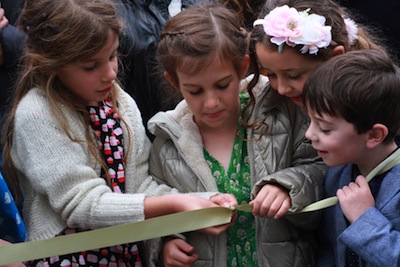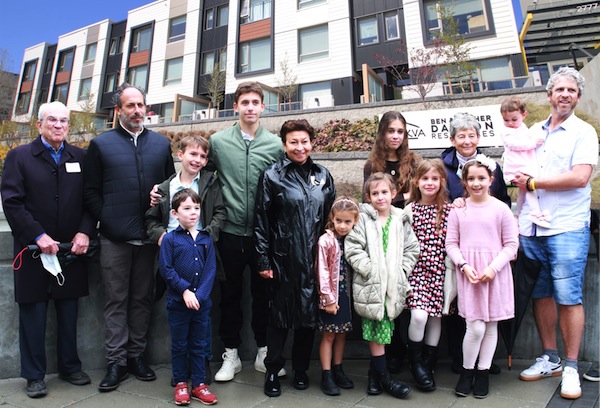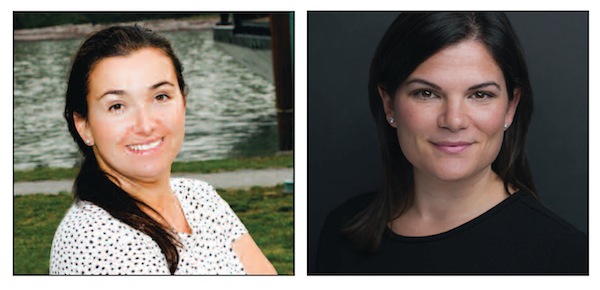Featured speakers at this year’s Choices are Hannah Amar, left, and Michelle Hirsch. (photo from Jewish Federation)
Hannah Amar wants people to keep in mind two words when they listen to her story: resilience and connection.
Toronto-born Amar was 10 years old when she and her parents were hit by a drunk driver in a catastrophic car accident. She was the sole survivor. She went to live with an aunt and uncle, in a home with little to no Jewish identity. Her quest to regain her Jewish identity and the difference it made at the most difficult moment of her adult life is a story she will share next month at Choices.
Choices is an annual celebration of the Jewish Federation of Greater Vancouver. (Click here for an interview with Federation’s women’s philanthropy co-chairs.) It brings together hundreds of Jewish women who have made a choice to support the community through volunteerism, professional work, engagement or a financial gift. This year’s event takes place virtually on Nov. 8, and will recognize the power of women’s individual and collective contributions. The keynote speaker this year is Michelle Hirsch, a Cleveland woman who mobilized her circle to support the Jewish community of Houston after Hurricane Harvey wreaked havoc on that city in 2017. Amar is the community speaker.
When Amar came to the University of British Columbia, she sought out Hillel, the Jewish student organization, in an effort to reconnect with her Jewishness. This was her initial foray into the community.
After university, she was working in a corporate office and met a man with whom she had two sons, 16 months apart. That relationship ended and he largely disappeared. With two kids and no child support, Amar struggled to make ends meet.
With no family to fall back on, Amar put her belongings in storage and spent the better part of a year with no fixed address. She had some savings intended for her kids’ education, which was all that kept the three of them off the streets or in a homeless shelter. At one point, she was living in a room above a Starbucks, reached through a long set of steep stairs – she was eight months pregnant and had a 1-year-old.
Earlier, though, when she was still at her office job, Amar passed by the Ohel Ya’akov Community Kollel, on West Broadway. Since leaving university, and Hillel, she had not been in close contact with the Jewish community. Coming from a kickboxing class, dressed in her hot pink hoodie, she stopped outside the Kollel and was wondering whether to go in when a rabbi came down the stairs with a lollipop in his mouth.
“I thought, I can totally approach this rabbi because he’s eating a lollipop,” she recalled.
Rabbi Levi Feigelstock invited her to services on Shabbat and, the following week, she was at his family’s Shabbat table. It was the beginning of a solid connection. Both of her sons had their bris at the Kollel.
As her relationship collapsed and her housing situation became critical, it was that connection with community that provided a safety net.
A few weeks ago, Amar and her kids – Sam, 7, and Judah, who is almost 6 – moved into a three-bedroom townhome at the Ben and Esther Dayson Residences in the River District of South Vancouver. The Dayson Residences are a project of Tikva Housing, a nonprofit society that provides access to affordable housing, primarily for Jewish low- to moderate-income adults and families. The neighbourhood, which opened in 2019, consists of 32 townhomes.
“My kids are so happy, I’m so happy,” said Amar. “It’s a life-changer. It really is.”
Around Sukkot, Chabad visited with their mobile sukkah and all the kids in the residences came out. Amar loves walking around and seeing Shabbat candles in windows.
“The sense of community here – it is remarkable,” she said. “Going from no fixed address and only being the three of us for so many years to finally reaching out and dipping our toes in community and now having that.… Reaching out to the Jewish community helped me.”
The kids have already made best friends in the neighbourhood and Amar is enjoying having neighbourhood kids dogpiling on her living room floor.
“The amount of stress that’s left my body is unbelievable,” she said. “I had pain every day. Just yesterday, I woke up and I had none, so that’s pretty remarkable. I feel it leaving my body.”
Two generations ago, when Amar’s grandparents arrived in Toronto from Morocco, they, too, were aided by the Jewish community organizations that were there to help.
“It just really goes to show you how the connection in the Jewish community is amazing and how the help there is also amazing,” she said.
The keynote speaker for the Choices event, Hirsch, will share the story of how a small act of tzedakah snowballed into a huge relief effort for the Jewish community of Houston.
Hirsch is senior vice-president of her family’s business, an insurance brokerage.
“We joke that our family’s business is not just insurance for people but it’s also in our blood to ensure the future of the Jewish community,” she said. Growing up in Akron, south of Cleveland, Hirsch saw the model her grandparents and parents set in that city’s relatively small Jewish community.
“Everyone was involved because everyone was involved,” she said. “Every Jew knew every Jew and that’s just how it was.”
Hirsch became active locally and internationally, with the Jewish Federations of North America’s Young Leadership Cabinet and, more recently, with the National Women’s Philanthropy Board. She also serves on the board of the Jewish Agency for Israel North America and as chair of Cleveland’s Women in Philanthropy.
When Hurricane Harvey hit, her Young Leadership Cabinet colleagues in Houston were posting photos of the disaster on the group’s social media page. “Everyone was asking what can we do to help,” Hirsch recalled. “Some of the people in Houston were saying, we need things: people need diapers, we need cleaning supplies, none of the stores are open, the roads are blocked. We can’t just go to the store or order something to get delivered.”
Courier companies and Amazon were not delivering in Houston, but private vehicles were permitted to enter the city. Hirsch connected with colleagues in Dallas and asked if it would be possible to corral supplies there and transport them to Houston. One of the donors to the Dallas Federation owns a shipping company, so they obtained a cargo truck.
Hirsch made a preliminary Amazon wish list – toiletries, cleaning supplies, toothbrushes, other necessities – and posted on her personal social media, asking colleagues from Young Leadership Cabinet and other connections to share it. She went to bed and, eight hours later, awoke to find more than 1,000 items had been purchased and were on their way to the Dallas JCC.
“We kept adding additional items and, a few days went by, and then the Amazon trucks just started rolling in,” she said. The cargo truck made its way from Dallas to Houston well before couriers resumed services. The Houston JCC became their warehouse and volunteers came, opened the boxes, sorted the items and prepared them for community members to collect what they needed.
A couple of weeks later, some of the organizers made the trip themselves, including Hirsch. They helped out on the ground, rummaging through the flooded JCC preschool to see what toys and other items could be salvaged.
“It sounds like a sad story,” Hirsch said, “but really it’s an inspiring story, not of just mobilizing but the idea of a community that was facing such destruction that just rose up together to really come together and put back the pieces. It’s just a beautiful story of people coming together.”
More of both these women’s stories will be shared at the Choices event. For information and to register, visit jewishvancouver.com/choices-form.



